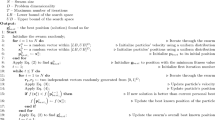Abstract
Orthogonal frequency division multiple access (OFDMA) is adopted in 4G wireless communication standard, where bandwidth resources can be split into smaller granular units. Tailored for slow adaptive OFDMA system, we study the energy-efficient resource allocation problem based on chance-constrained programming. The optimization objective is to minimize the power consumption over subcarrier and power allocation. The constraints include the outage probability constraint and target bit error rate (BER) constraint. Because the optimization problem contains the probabilistic constraint, it is a chance-constrained programming problem. Hence, support vector machine (SVM) is adopted to compute the outage probability constraint. Then, we integrate SVM and genetic simulated annealing (GSA) to develop hybrid genetic simulated annealing (HGSA). Simulation tests verify that HGSA not only has the lower consumption power, but also satisfies the outage probability constraint.









Similar content being viewed by others
References
Alexandru AT, Nouredine M, Talbi EG (2008) A grid-based genetic algorithm combined with an adaptive simulated annealing for protein structure prediction. Soft Comput 12(12):1185–1198
Catarina S, Bernardete R (2007) On text-based mining with active learning and background knowledge using SVM. Soft Comput 11(6):519–530
Dai QY, Zhao YW, Zhao J (2008) A resource allocation strategy using FDMA over wireless relay networks, IEEE WiCOM’08. IEEE 1:1–5
Damji D, Tho LN (2006) Dynamic downlink OFDM resource allocation with interference mitigation and macro diversity for multimedia services in wireless cellular systems. IEEE Trans Veh Technol 55(5):1555–1564
Dang WB, Tao MX, Mu H et al (2010) Subcarrier-pair based resource allocation for cooperative multi-relay OFDM systems. IEEE Trans Wirel Commun 9(5):1640–1649
Gen MS, Liu BD, Ida KC (1996) Evolution program for deterministic and stochastic optimizations. Eur J Oper Res 94(3):618–625
Huang JW, Vijay GS, Rajeev A et al (2009) Joint scheduling and resource allocation in uplink OFDM systems for broadband wireless access networks. IEEE J Select Areas Commun 27(2):226–234
Huang JW, Vijay GS, Rajeev A et al (2009) Downlink scheduling and resource allocation for OFDM systems. IEEE Trans Wirel Commun 8(1):288–296
Ji X, Huang JW, Chiang M et al (2009) Scheduling and resource allocation for SVC streaming over OFDM downlink systems. IEEE Trans Circuits Syst Video Technol 19(10):1549–1555
Katoozian M, Navaie K, Halim Y (2009) Utility-based adaptive radio resource allocation in OFDM wireless networks with traffic prioritization. IEEE Trans Wirel Commun 8(1):66–77
Konstantinos D, Evgenia A, Michael T (2009) Intelligent discovery of the capabilities of reconfiguration options in a cognitive wireless B3G context. Soft Comput 13(10):945–958
Lee KD, Yum TSY (2010) On pareto-efficiency between profit and utility in OFDM resource allocation. IEEE Trans Commun 58(11):3277–3285
Lei X, Qian F, Li YP et al (2016) Resource allocation based on quantum particle swarm optimization and RBF neural network for overlay cognitive OFDM System. Neurocomputing 173(3):1250–1256
Li WL, Zhang YJ, So AMC et al (2010) Slow adaptive OFDMA systems through chance constrained programming. IEEE Trans Signal Processing 58(7):3858–3869
Murat K, Ahmed K, Ender O et al (2013) A greedy gradient-simulated annealing selection hyper heuristic. Soft Comput 17(12):2279–2292
Oikonomou A, Demestichas P, Tsagkaris K et al (2005) Management of the power control operation in HIPERLAN/2 networks. Soft Comput 9(2):128–142
Salman AK, Andries PE (2009) Fuzzy hybrid simulated annealing algorithms for topology design of switched local area networks. Soft Comput 13(1):45–61
Suykens JAK, Vandewalle J (2000) Recurrent least squares support vector machines. IEEE Trans Circuits Syst I Fund Theory Appl 47(7):1109–1114
Vicenc T, Isaac C, Sadaaki M et al (2010) Container loading for nonorthogonal objects: an approximation using local search and simulated annealing. Soft Comput 14(5):537–544
Wang T, Vandendorpe L (2011) Sum rate maximized resource allocation in multiple DF relays aided OFDM transmission. IEEE J Select Areas Commun 29(8):1559–1571
Xu J, Lee SJ, Kang WS et al (2010) Adaptive resource allocation for MIMO-OFDM based wireless multicast systems. IEEE Trans Broadcast 56(1):98–102
Xu L, Xu DZ, Zhang XF et al (2011) A cross-layer resource allocation scheme for WLANs with multipacket reception. ETRI J 33(2):184–193
Xu L, Xu DZ, Zhang XF et al (2011) Dynamic resource allocation with finite rate feedback for muliuser MIMO-OFDM systems. J Circuits Syst Comput 20(3):501–513
Xu L, Li YP, Yang YW (2014) Resource allocation of limited feedback in clustered wireless mesh networks. Wirel Pers Commun 75(2):901–913
Xu J, Huang YL (2007) Using SVM to extract acronyms from text. Soft Comput 11(4):369–373
Xu L, Li YP, Yang YW et al (2014) Proportional fairness resource allocation scheme based on quantised feedback for multiuser orthogonal frequency division multiplexing system. IET Commun 8(16):2925–2932
Yin PP, Sun FC, Wang C et al (2008) An adaptive feature fusion framework for multi-class classification based on SVM. Soft Comput 12(7):685–691
Acknowledgments
The authors gratefully acknowledge the financial support from the National Natural Science Foundation of China (No. 61301108, 61371169, 61272419), Jiangsu Planned Projects for Postdoctoral Research Funds (No. 1301024C), Postdoctoral Science Foundation of China (No. 2013M541672), Funding of China Scholarship Council, Prospective Study Project in Jiangsu Province in the Future Network (BY2013095-3-02), Jiangsu Province Research Prospective Project (BY2014089, BY2013039, BY2013037) and Lianyungang International Cooperation Project (CH1304), the Fundamental Research Funds for the Central Universities (No. 30915011320).
Author information
Authors and Affiliations
Corresponding author
Ethics declarations
Conflict of interest
The authors declare that they have no conflict of interest.
Additional information
Communicated by V. Loia.
Rights and permissions
About this article
Cite this article
Xu, L., Zhou, Xz., Li, Qm. et al. Energy-efficient resource allocation for multiuser OFDMA system based on hybrid genetic simulated annealing. Soft Comput 21, 3969–3976 (2017). https://doi.org/10.1007/s00500-016-2047-8
Published:
Issue Date:
DOI: https://doi.org/10.1007/s00500-016-2047-8




